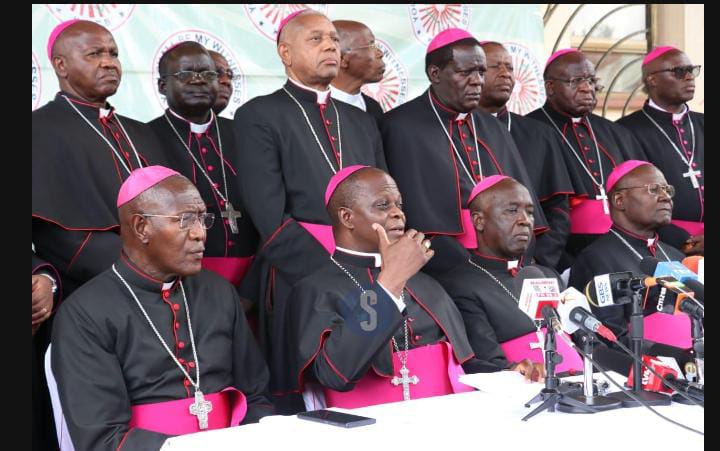
By Lisbeth Micheni, Kenya
In one of the most scathing criticisms directed at the government in recent times, the Kenya Conference of Catholic Bishops has condemned the Kenya Kwanza administration as increasingly out of touch with the realities facing ordinary Kenyans.
In a strongly-worded statement, the bishops accused the government of relying on brutal repression to silence critics, asserting that the administration thrives on half-truths and outright lies.
But at State House, President Ruto chaired a Cabinet meeting where he was briefed on the stability of the macro-economic situation in the country following two years of deliberate fiscal management measures.
The Kenyan economy continues, according to the Cabinet, to be on its strong recovery from past global and domestic challenges.
“Members were informed that inflation, which reflects the increase in prices over time, had declined substantially to 2.7 per cent last month. down from a high of 9.6 per cent in September 2022.
This is the lowest inflation rate since 2007 during President Mwai Kibaki’s tenure and aligns with the target set in the Kenya Kwanza Manifesto.
Despite the government’s optimistic projections about economic recovery, the everyday experiences of Kenyans paint a starkly different picture.
The clergy expressed deep concern that the Ruto administration has transformed Kenya into an “Orwellian dystopian authoritarian” state, where the truth is dictated by government officials, and dissent is met with intimidation, abduction, or even assassination.
This bold message from the bishops is particularly impactful considering the political landscape.
Just two years ago, the Kenya Kwanza administration benefited from the support of various religious groups, including the Catholic Church, during its ascent to power.
The bishops’ statement reflects a growing discontent among religious leaders who feel that they have been abandoned by the very government they helped elevate.
The KCCB, led by Archbishop Maurice Makumba of Kisumu, emphasised that their concerns stem from multiple unaddressed attempts to engage with the government.
“We feel compelled to voice our grave concerns regarding the troubling political climate that has gripped our country,” they stated.
The bishops criticised the government’s narrative of economic recovery, particularly remarks made by Deputy President Kithure Kindiki, who claimed a strengthening shilling against the US dollar signified improvement in the economy.
The clergy countered that such statements demonstrate a disconnect from the day-to-day struggles of Kenyans.
“It seems that truth does not exist, and if it does, it is only what the government says,” they asserted, urging Kenyans to reject the lies perpetuated by politicians.
The bishops highlighted various pressing issues facing the nation: a crumbling public health system, an oppressive tax regime pushing millions into poverty, and rampant corruption among the political elite.
They also pointed to a surge in insecurity characterized by abductions, torture, and killings of political dissenters.
The church leaders asserted that the government can no longer be trusted to uphold the interests of its citizens.
The statement also addressed the alarming rise in random street abductions and disappearances, which have drawn the attention of human rights organisations such as Human Rights Watch and Amnesty International.
Reports indicate that a special unit within the Directorate of Criminal Investigations, known as the Operation Support Unit, has been implicated in these abductions.
This unit is said to operate with a degree of impunity, using unmarked vehicles and masked operatives to target individuals, often leading to illegal detentions and torture.
The bishops lamented the plight of families whose children have gone missing or have been killed in the aftermath of the Gen Z protests in June 2024.
Many of these victims had raised concerns about the pervasive corruption afflicting the government.
“Who is abducting these people, and is the government unable to stop these abductions and killings?” the bishops questioned, emphasising the urgent need for accountability.
In addition to human rights abuses, the bishops criticized the government’s newly introduced social health insurance scheme, which they claim has failed to address the financial struggles of faith-based hospitals.
They revealed that the state owes these institutions approximately Sh3 billion, crippling their ability to provide essential services to the underprivileged.
The bishops underscored the importance of these hospitals in serving the poor, noting that their financial strain adversely impacts countless lives.
Moreover, the church leaders expressed discontent over increased fees for missionary work permits, which they believe stifles the efforts of religious organisations to contribute positively to society.
The bishops called for a more supportive environment for such initiatives, emphasising their role in community development.
The bishops also weighed in on the political discourse surrounding term limits for elected officials.
They criticised proposals from some lawmakers seeking to extend term limits, asserting that the current two-term limit of ten years is sufficient for any visionary leader to establish a strong legacy.
“A two-term limit is ample time for any visionary political leader to leave a strong legacy if they perform,” they stated, warning against potential moves that could undermine democratic principles.
categories
recent posts



NIGERIA: Lagos To Introduce Special Number Plates For Persons With Disabilities

NIGERIA: Afrobeats Star Spyro Dedicates New House

